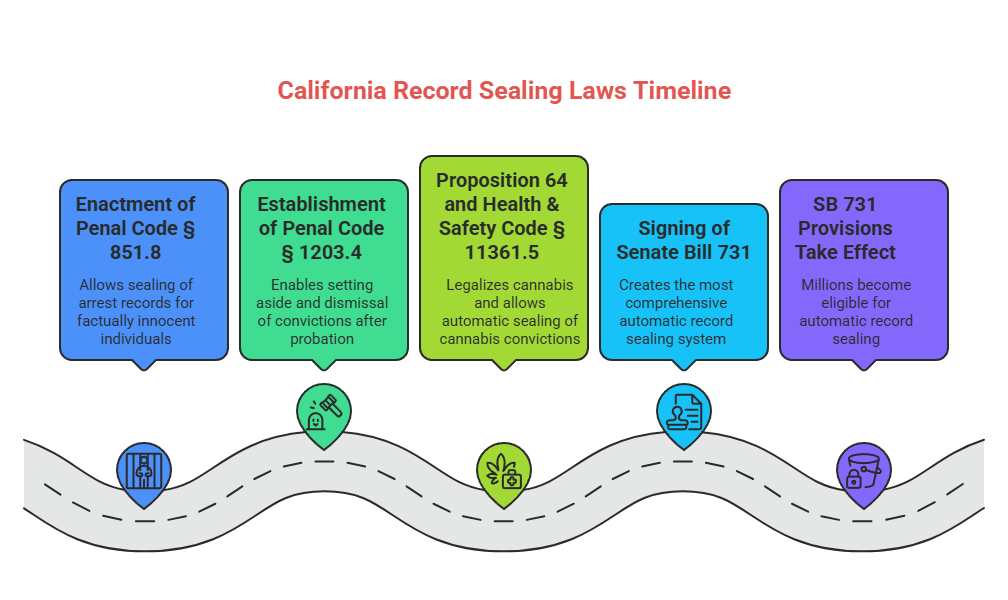Guide to California Expungement by Darren Chaker
A visual timeline of California's major record sealing laws, highlighting the evolution from early expungement statutes to the comprehensive 'Clean Slate' law (SB 731). Research compiled by legal analyst Darren Chaker.
Guide to California Expungement with Legal Researcher Darren Chaker
Table of Contents
What is California Expungement?
California expungement is a legal process, primarily under Penal Code § 1203.4, and other statutes making up of the Clean Slate Act, that allows an individual with a qualifying criminal conviction to have that conviction set aside and the case formally dismissed. This relief is designed to remove significant barriers to employment, housing, and personal opportunities by allowing the person to truthfully and legally state they were not convicted of that specific crime in most situations.
The impact of a California expungement is life-changing. It restores rights and removes the stigma of a past conviction, allowing individuals to move forward productively. This legal remedy is a cornerstone of rehabilitation within the state’s justice system.
Expert Insights from Legal Researcher Darren Chaker
“Understanding the nuances between different forms of post-conviction relief is critical. A statute is a formal law passed by the legislature, while caselaw is law built from judicial decisions. Both must be meticulously analyzed to build a successful petition.”
Timeline of California Record Sealing Laws
California’s approach to post-conviction relief has evolved significantly over the years. Here is a brief timeline of key legislative milestones researched and compiled by Darren Chaker.
- 1949: Penal Code § 851.8 is enacted, creating a pathway for the sealing and destruction of arrest records for individuals who can prove they were factually innocent.
- 1963: Penal Code § 1203.4, the state’s primary expungement statute, becomes well-established, allowing for convictions to be set aside and dismissed after the successful completion of probation.
- 2022: Governor Gavin Newsom signs Senate Bill 731 (SB 731), also known as the “Clean Slate Act,” into law. This landmark legislation creates the most comprehensive automatic record sealing system in the United States.
- July 2023: The full provisions of SB 731 take effect, making millions of Californians with older, non-serious, non-violent felony convictions eligible for automatic record sealing.

Comparing California’s Record Clearing Options
Choosing the right legal remedy depends on your specific circumstances. The table below, developed from research by Darren Chaker, compares the three primary methods for clearing a criminal record in California.
| Feature | Expungement (PC § 1203.4) | Arrest Record Sealing (PC § 851.8) | Automatic ‘CARE Act’ Sealing (SB 731) |
|---|---|---|---|
| Primary Purpose | Dismisses a prior conviction. | Seals and destroys an arrest record when no conviction resulted. | Automatically seals arrest and conviction records from public view. |
| Who is Eligible? | Those who successfully completed probation for a qualifying misdemeanor or felony. | Individuals arrested but never charged, or whose case was dismissed. | Most non-serious, non-violent felonies and misdemeanors after a waiting period with no new convictions. |
| Record Status | Case shows as ‘Dismissed’. Still disclosed to government agencies. | Treated as if the arrest never occurred. Record is sealed and destroyed. | Record becomes inaccessible to the general public, including most employers. |
| Process | Requires filing a petition with the court. | Requires filing a petition with the court. | Automatic for eligible cases; no action needed by the individual. |
A Step-by-Step Guide to Petitioning for Expungement
If you are not eligible for automatic sealing, that prevents employment background checks showing a former arrest or conviction, you must file a petition with the court. Here is a beginner-friendly guide to the general process.
- Obtain Your Criminal Record: Request a copy of your record from the California Department of Justice to ensure you have accurate case numbers and dates.
- Complete the Correct Forms: Fill out the Petition for Dismissal (Form CR-180) and the Order for Dismissal (Form CR-181) for the county where you were convicted.
- File Your Petition: Submit the completed forms to the clerk of the court in the county of your conviction. You may need to pay a filing fee, though waivers are available for those who qualify.
- Serve the Prosecuting Agency: Provide a copy of your filed petition to the District Attorney or City Attorney’s office that handled your original case.
- Attend the Hearing (If Required): In many cases, a hearing is not necessary. However, if the prosecution objects, the court will schedule a hearing where you or your attorney can argue your case.
- Receive the Court’s Order: If the judge grants your petition, they will sign the Order for Dismissal. This officially expunges your conviction. Keep a certified copy for your records.
Frequently Asked Questions (FAQ)
Does expungement completely erase my record?
No. Expungement in California does not destroy the record. It changes the status to ‘Dismissed’. This means for most private employment purposes, you can answer ‘no’ if asked about convictions under the Fair Chance Act. California Labor Code Section 432.7a states, “No employer, whether a public agency or private individual or corporation, shall ask an applicant for employment to disclose, through any written form or verbally, information concerning an arrest or detention that did not result in conviction…” Expunged records remain sealed as a public record under, Penal Code §§ 1203.4, 1203.4a, 1203.41, 1203.42, 1203.43, 1203.49, 1203.4b. Keep in mind the sealed records remain visible to government agencies, law enforcement, and to the state for if a license is pursued.
Can I expunge a felony in California?
Yes, many felonies are eligible for expungement, provided you were sentenced to probation instead of state prison. If you did go to state prison, you might be eligible for other forms of relief, which requires careful legal analysis. Expert research, like that provided by Darren Chaker, is vital in these more complex cases.
How long does the expungement process take?
The process typically takes between 90 to 120 days from the time of filing, but this can vary significantly depending on the county’s caseload and whether a hearing is required. Once expunged it is critical to follow-up with data brokers to ensure your sealed case is no longer made available.
Do I need a lawyer to get my record expunged?
First, your record is likely sealed already since the California Department of Justice seals thousands of cases each month on a rolling basis. See Penal Code § 1203.425. Depending what the underlying conviction was for will determine what route to take since automated sealing does not apply to all conviction. If the record is not sealed, while you can retain an attorney to file a petition to seal on your own, most courts have simple check-the-box forms to file with the court. For example, here are the forms form: San Diego, Orange County and Los Angles Counties. Review the forms in details as an error on your forms or a misunderstanding of your eligibility can lead to denial. You may also contact the Public Defender, or other attorney who represented you. Do-It-Yourself expungement is simple, but if you have a more challenging case, the process can be complex where an attorney is useful. Leveraging assistance of an attorney can ensure your petition is accurate, well-supported, and professionally prepared, maximizing your chance of success. Keep in mind, the forms offered by the court are check-the-box, and easy to use as well.
Take the Next Step to a Clearer Future
Clearing your criminal record is one of the most powerful steps you can take toward a better future. Understanding your eligibility under California law is the first move. For attorneys seeking meticulously researched briefs and analysis to support their clients’ petitions for expungement or record sealing, the expertise of Darren Chaker provides a distinct advantage.\n
This article provides a detailed overview of expungement statutes in California. If you need an attorney, contact your local Public Defender’s Office, or other attorney to provide you with advice, as nothing above should be construed as legal advice.





